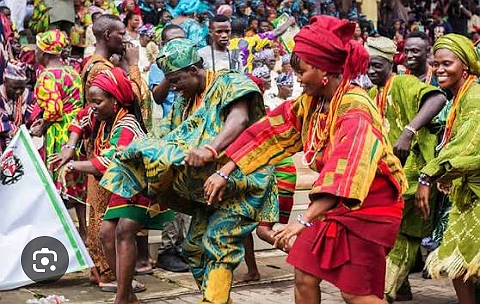"HISTORY OF YORUBA CULTURE"
Yoruba culture has a rich, complex history, with its origins tied to the Volta-Niger populations by the 1st millennium BCE and the foundation of the city of Ile-Ife. By the 15th century, the Yoruba formed numerous kingdoms and city-states, such as the dominant Oyo Empire, which thrived through military strength and trade. Key cultural aspects include a sophisticated artistic tradition, especially in sculpture and metalwork, and a vibrant spiritual belief system centered on deities and ancestral veneration.
Origins and Early History
Deep Roots: The Yoruba people developed from earlier Mesolithic populations in West Africa, with settlements in Ile-Ife existing as early as the 10th to 6th centuries BCE.
Ile-Ife: This city became a powerful city-state by the 8th century CE, establishing a spiritual and cultural heart for the Yoruba people and laying the groundwork for the Ife Empire.
Kingdoms and Empire Building
Oyo Empire: Emerging in the 17th century, the Oyo Empire became a dominant force in the region through its military organization and economic power.
Urbanism: The Yoruba are noted for their precolonial urbanism, creating densely populated towns and cities like Oyo and Ile-Ife that served as centers for political, religious, and economic activity.
Art and Spirituality
Masterful Artistry: The Yoruba developed renowned artistic traditions, including intricate wood carvings, bronze sculptures, and terracottas, particularly during the "golden age" of Ile-Ife (c. 1200–1420 CE).
Rich Mythology: Yoruba cosmology centers on figures like Oduduwa, who is believed to have created the world and the first humans at Ile-Ife.
Connection to Beliefs: Yoruba art and cultural practices are deeply connected to their spiritual beliefs, with many sculptures and artworks serving religious purposes.
Trade and Global Influence
Trade Networks: The Yoruba engaged in extensive trade networks, both locally and with Europeans, contributing to their economic prosperity and cultural exchange.
African Diaspora: A significant portion of the Yoruba population was tragically subjected to the transatlantic slave trade, leading to the preservation and adaptation of their culture in places like Brazil and Cuba.
Decline of Traditional Power
Internal Strife: The late 18th and 19th centuries saw a decline in the power of Yoruba kingdoms like Oyo due to internal conflicts and external pressures from groups like the Fon of Dahomey and the Fulani.
Colonial Era: The Yoruba eventually came under British rule, which further reduced the political influence of the traditional kingships and altered the course of Yoruba history.
Yoruba culture has a rich, complex history, with its origins tied to the Volta-Niger populations by the 1st millennium BCE and the foundation of the city of Ile-Ife. By the 15th century, the Yoruba formed numerous kingdoms and city-states, such as the dominant Oyo Empire, which thrived through military strength and trade. Key cultural aspects include a sophisticated artistic tradition, especially in sculpture and metalwork, and a vibrant spiritual belief system centered on deities and ancestral veneration.
Origins and Early History
Deep Roots: The Yoruba people developed from earlier Mesolithic populations in West Africa, with settlements in Ile-Ife existing as early as the 10th to 6th centuries BCE.
Ile-Ife: This city became a powerful city-state by the 8th century CE, establishing a spiritual and cultural heart for the Yoruba people and laying the groundwork for the Ife Empire.
Kingdoms and Empire Building
Oyo Empire: Emerging in the 17th century, the Oyo Empire became a dominant force in the region through its military organization and economic power.
Urbanism: The Yoruba are noted for their precolonial urbanism, creating densely populated towns and cities like Oyo and Ile-Ife that served as centers for political, religious, and economic activity.
Art and Spirituality
Masterful Artistry: The Yoruba developed renowned artistic traditions, including intricate wood carvings, bronze sculptures, and terracottas, particularly during the "golden age" of Ile-Ife (c. 1200–1420 CE).
Rich Mythology: Yoruba cosmology centers on figures like Oduduwa, who is believed to have created the world and the first humans at Ile-Ife.
Connection to Beliefs: Yoruba art and cultural practices are deeply connected to their spiritual beliefs, with many sculptures and artworks serving religious purposes.
Trade and Global Influence
Trade Networks: The Yoruba engaged in extensive trade networks, both locally and with Europeans, contributing to their economic prosperity and cultural exchange.
African Diaspora: A significant portion of the Yoruba population was tragically subjected to the transatlantic slave trade, leading to the preservation and adaptation of their culture in places like Brazil and Cuba.
Decline of Traditional Power
Internal Strife: The late 18th and 19th centuries saw a decline in the power of Yoruba kingdoms like Oyo due to internal conflicts and external pressures from groups like the Fon of Dahomey and the Fulani.
Colonial Era: The Yoruba eventually came under British rule, which further reduced the political influence of the traditional kingships and altered the course of Yoruba history.
Topic Live
























